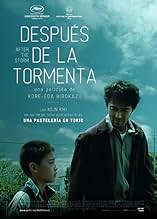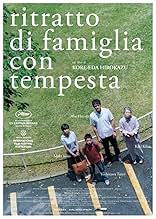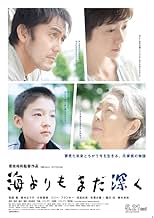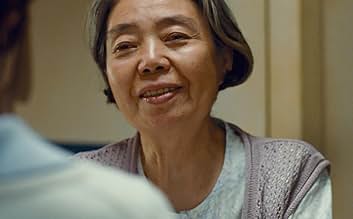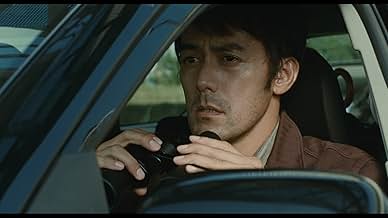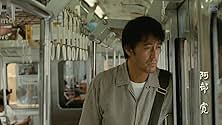ÉVALUATION IMDb
7,4/10
14 k
MA NOTE
Après la mort de son père, un détective privé a du mal à payer sa pension alimentaire et à renouer avec son fils et son ex-femme.Après la mort de son père, un détective privé a du mal à payer sa pension alimentaire et à renouer avec son fils et son ex-femme.Après la mort de son père, un détective privé a du mal à payer sa pension alimentaire et à renouer avec son fils et son ex-femme.
- Prix
- 2 victoires et 13 nominations au total
Avis en vedette
Remarkable consistency in delivering great dramas. If you are a drama film fan without the language barrier, then you must have seen at least a couple of films of Hirokazu Koreeda. Less than a year ago I saw his new arrival 'Our Little Sister'. Despite not overwhelmingly impressed with that, I won't say that I did not enjoy it. I always fascinated with the realistic portrayal, but the points should be executed so well than leaving empty scenes and dialogues, and calling it an art film. This one was much better. The first impression was okay, but after giving some time between my watch and writing this review, I kind of started to like it more.
First of all, this story was not new for me. I have already seen a few similar themed films from other parts of the world, particularly in Hollywood. But none of them were as serious as this one while narrating its tale. The storyline was simple, entirely focused on a family, fighting on stumbling marriage. It was a long introduction, particularly aimed at a father, like how he messed up in his life with gambling. But opening few minutes made him look like a man of example. Only in the following event you would know how deep his troubles are.
Other than his family, his work field was introduced to us. Being a writer, but for a few quick bucks working as a private eye on his part time, he misuses the opportunity with his loyal friend. Once the film reaches the half way mark, the focus shifts back to the family where the remaining story takes place. It was a stormy day and they all gather in his mother's apartment. This is where everything will be cleared out, whether the marriage will be saved or not. But the mother's one final push as it seems planned perfectly, would it deliver a result is what you should watch it to learn.
❝I wonder why it is that men can't love the present. Either they just keep chasing whatever it is they've lost, or they keep dreaming beyond their reach.❞
You can't doubt Hiroshi Abe's presence. He was perfect along with Kirin Kiki, whose a few films I've seen before, but only started to notice recently with her amazing performance from 'Sweet Bean'. The casting looked great, and the locations. I always like films about elderly people, especially to highlight their struggle. And most of the Japanese films I have seen on that concept were just like the way I wanted. Maybe because there are lots of aging people in Japan than anywhere else. Just kidding.
Obviously dialogues are very important for a film and there were many good lines spoken. At one point in the final stage, it flips towards sentiments. Very touching conversation, particularly coming from an old and experienced woman, which is definitely worth taking heed. This is a family film. Despite about a marriage crisis, there is no speculation, like twist and turns. Interesting enough with its plain narration. True to its title and when the title part comes into play, that's where it gets its peak. With its nearly two hours runtime, the pace was acceptable, but patience needed for those got trouble with long films.
This is the film about our life, that we can try for what we want to be, but achieving it not easy, not everybody would succeed that. Accepting the fact, as life my go on was the message. Incredible writing and direction. Feels like straight out of a book, it's an original screenplay though. Surely you don't want to miss this film, from this director. Because if you do, it is equal to failing to watch the latest Woody Allen film. Only he's a Japanese version. My final words are the director already made his masterpiece(s), but still it is near to one compared to the international cinemas. So I'm not saying it is a must, but surely worth a try.
7½/10
First of all, this story was not new for me. I have already seen a few similar themed films from other parts of the world, particularly in Hollywood. But none of them were as serious as this one while narrating its tale. The storyline was simple, entirely focused on a family, fighting on stumbling marriage. It was a long introduction, particularly aimed at a father, like how he messed up in his life with gambling. But opening few minutes made him look like a man of example. Only in the following event you would know how deep his troubles are.
Other than his family, his work field was introduced to us. Being a writer, but for a few quick bucks working as a private eye on his part time, he misuses the opportunity with his loyal friend. Once the film reaches the half way mark, the focus shifts back to the family where the remaining story takes place. It was a stormy day and they all gather in his mother's apartment. This is where everything will be cleared out, whether the marriage will be saved or not. But the mother's one final push as it seems planned perfectly, would it deliver a result is what you should watch it to learn.
❝I wonder why it is that men can't love the present. Either they just keep chasing whatever it is they've lost, or they keep dreaming beyond their reach.❞
You can't doubt Hiroshi Abe's presence. He was perfect along with Kirin Kiki, whose a few films I've seen before, but only started to notice recently with her amazing performance from 'Sweet Bean'. The casting looked great, and the locations. I always like films about elderly people, especially to highlight their struggle. And most of the Japanese films I have seen on that concept were just like the way I wanted. Maybe because there are lots of aging people in Japan than anywhere else. Just kidding.
Obviously dialogues are very important for a film and there were many good lines spoken. At one point in the final stage, it flips towards sentiments. Very touching conversation, particularly coming from an old and experienced woman, which is definitely worth taking heed. This is a family film. Despite about a marriage crisis, there is no speculation, like twist and turns. Interesting enough with its plain narration. True to its title and when the title part comes into play, that's where it gets its peak. With its nearly two hours runtime, the pace was acceptable, but patience needed for those got trouble with long films.
This is the film about our life, that we can try for what we want to be, but achieving it not easy, not everybody would succeed that. Accepting the fact, as life my go on was the message. Incredible writing and direction. Feels like straight out of a book, it's an original screenplay though. Surely you don't want to miss this film, from this director. Because if you do, it is equal to failing to watch the latest Woody Allen film. Only he's a Japanese version. My final words are the director already made his masterpiece(s), but still it is near to one compared to the international cinemas. So I'm not saying it is a must, but surely worth a try.
7½/10
There are not many directors whose films I greet with enthusiasm, let alone Japanese ones. I think Hirokazu Koreeda is the only one. His films are a different breed - simple in design, but brilliant in architecture and sublime in closure.
Koreeda is the leading exponent in contemplative cinema. Under his minimalist approach, the essence of familial life and couplehood is distilled into abstract thoughts lingering like warm tendrils wrapped around your mind. The movie may be over but it refuses leave the confines of your consciousness and you would want to surrender to its warm lull again. The tone of After the Storm is pitch-perfect - nobody screams in your face, there are no pointing fingers, no low brow soap-opera. The acting is exquisite and nuanced. What is not said speaks louder than what is uttered. There is humour of the familiar kind; it is the kind of humour you laughed heartily because it is so familiar and you recognise the situations because you have gone through them before. There are not many filmmakers who are as sensitive as Koreeda. Above all else, this is a director who listens to characters' inner thoughts and emotions like an old master piano tuner and he knows how to calibrate the performances for everlasting emotional heft. For Koreeda, it is always about the small moments leading to the big truths.
After the Storm is not one of Koreeda's best films (it needlessly took too long to establish Ryota's character) but it easily transcends way above all the flashy films that inundate our cinemas like ants to candies. I wish I had a notebook last night because some of the metaphors are amazing. Here is one, asseverated by the grandmother Yoshiko, "The longer a stew sits, the more flavour it develops, just like people."
Koreeda is the leading exponent in contemplative cinema. Under his minimalist approach, the essence of familial life and couplehood is distilled into abstract thoughts lingering like warm tendrils wrapped around your mind. The movie may be over but it refuses leave the confines of your consciousness and you would want to surrender to its warm lull again. The tone of After the Storm is pitch-perfect - nobody screams in your face, there are no pointing fingers, no low brow soap-opera. The acting is exquisite and nuanced. What is not said speaks louder than what is uttered. There is humour of the familiar kind; it is the kind of humour you laughed heartily because it is so familiar and you recognise the situations because you have gone through them before. There are not many filmmakers who are as sensitive as Koreeda. Above all else, this is a director who listens to characters' inner thoughts and emotions like an old master piano tuner and he knows how to calibrate the performances for everlasting emotional heft. For Koreeda, it is always about the small moments leading to the big truths.
After the Storm is not one of Koreeda's best films (it needlessly took too long to establish Ryota's character) but it easily transcends way above all the flashy films that inundate our cinemas like ants to candies. I wish I had a notebook last night because some of the metaphors are amazing. Here is one, asseverated by the grandmother Yoshiko, "The longer a stew sits, the more flavour it develops, just like people."
Most films these days do not have something to 'say' anymore. They don't have a deeper meaning. And if they do, it's mostly superficial or so complex you don't really understand. 'After the Storm' by Hirokuzu Kore-eda has something to say, it's like a condensed moment of life. You will be dumbstruck by it's beauty.
The story deals with Ryota, struggling with financial problems, and trying to keep contact with his son after divorcement. He works as a private detective, spying on affairs and looking for lost cats while his real passion lies in writing literature.
The entire film is built around a central story part where they take shelter from a taifun, it involves scenes of such profound beauty, you will be moved to tears. The beauty lies in the things that are not spoken out, yet linger in the air like rain: the missed opportunities to be happy, love gone by and yet - still there.
To say the film deals with abandoned dreams in the face of reality is wrong, it's the contrary. The film says: If you keep waiting for beauty in life, you will not realize that it has already arrived. Just not the way you thought it would.
The story deals with Ryota, struggling with financial problems, and trying to keep contact with his son after divorcement. He works as a private detective, spying on affairs and looking for lost cats while his real passion lies in writing literature.
The entire film is built around a central story part where they take shelter from a taifun, it involves scenes of such profound beauty, you will be moved to tears. The beauty lies in the things that are not spoken out, yet linger in the air like rain: the missed opportunities to be happy, love gone by and yet - still there.
To say the film deals with abandoned dreams in the face of reality is wrong, it's the contrary. The film says: If you keep waiting for beauty in life, you will not realize that it has already arrived. Just not the way you thought it would.
After The Storm is an absolutely brilliant film, as it deals with the trials and tribulations of a father & perceived loser in the face of challenging life circumstances. Hiroshi Abe plays the role of Shinoda Ryota, a detective that is financially broke, divorced and living in the illusion of his past glory as an award winning author. He struggles to make ends meet and often resorts to gambling, stealing and backhand deals that involves extortion in order to support himself and to pay child support for his only son, Shingo.
Another eye-catching performance to look put for is by Ryota's mom, Yoshiko, played by Kirin Kiki. She absolutely nails the role of a bewildered, lonely and regretful single grandmother, often dwelling on the unfortunate circumstances of the past and blaming her late husband for how her son turned out. She provides most of the comedic moments in the movie, as her tendency to be over-bearing and cheapskate at times, will make you giggle in the very least. She also seems obsessed and resigned to the idea that she will die alone, hence she keeps requesting her son & daughter to keep her company as much as possible. On top of that, she also harbors the faint hope that her son can be re-united with his ex-wife, and tries to set them up to sleep together during a night of storm.
Overall, the theme of After the Storm is dealing with the present circumstances in the face of unrealized dreams and broken hopes. This theme is strong in the characters of Ryota and Yoshiko. Additionally, Ryota's ex-wife, Kyoko (played by Yoko Maki) also plays an important role as she embodies the person whom manages to focus her life solely in the present times. Whilst Ryota still perceives himself as the father responsible for Shingo's journey through his current childhood phase, Kyoko has moved on and has accepted the fact that Ryota was never cut out to be a responsible father. She has even found a new boyfriend and except for the monthly visit, would rather Shingo not be spending time with his actual dad.
What really catches the eye about this movie, is that even in a fully developed country like Japan, with is high standards of living and apparent high-culture, there exists people like Ryota; someone who is left behind by the fast-moving economy and rebels against the norm of participating in the corporate rat-race to succeed career-wise. He can be pictured as someone who is very defensive whenever questioned on his life choices and habits. However, just like a starry-eyed young graduate, Ryota had dreams of his own for a stable government job, which somehow never came to be. However, the pride in him never dissolves, as the once Award-winning author still feels he deserves recognition for his past work.
Another eye-catching performance to look put for is by Ryota's mom, Yoshiko, played by Kirin Kiki. She absolutely nails the role of a bewildered, lonely and regretful single grandmother, often dwelling on the unfortunate circumstances of the past and blaming her late husband for how her son turned out. She provides most of the comedic moments in the movie, as her tendency to be over-bearing and cheapskate at times, will make you giggle in the very least. She also seems obsessed and resigned to the idea that she will die alone, hence she keeps requesting her son & daughter to keep her company as much as possible. On top of that, she also harbors the faint hope that her son can be re-united with his ex-wife, and tries to set them up to sleep together during a night of storm.
Overall, the theme of After the Storm is dealing with the present circumstances in the face of unrealized dreams and broken hopes. This theme is strong in the characters of Ryota and Yoshiko. Additionally, Ryota's ex-wife, Kyoko (played by Yoko Maki) also plays an important role as she embodies the person whom manages to focus her life solely in the present times. Whilst Ryota still perceives himself as the father responsible for Shingo's journey through his current childhood phase, Kyoko has moved on and has accepted the fact that Ryota was never cut out to be a responsible father. She has even found a new boyfriend and except for the monthly visit, would rather Shingo not be spending time with his actual dad.
What really catches the eye about this movie, is that even in a fully developed country like Japan, with is high standards of living and apparent high-culture, there exists people like Ryota; someone who is left behind by the fast-moving economy and rebels against the norm of participating in the corporate rat-race to succeed career-wise. He can be pictured as someone who is very defensive whenever questioned on his life choices and habits. However, just like a starry-eyed young graduate, Ryota had dreams of his own for a stable government job, which somehow never came to be. However, the pride in him never dissolves, as the once Award-winning author still feels he deserves recognition for his past work.
In a relatively short time span, I've seen three films by Hirokazu Kore-Eda, and I'm planning to see many more. It seems most of his work is focused on family relations, and his films are touching, heartfelt real life dramas. The raw material for Kore-Eda's films are emotions, and the ways his protagonists express them in words and by their behaviour.
Like the two other films I've seen ('Our Little Sister' and 'Like Father, Like Son'), 'After the Storm' deals with parents, children, grandchildren and siblings. In this case, the central character is a divorced writer with financial problems, who has taken a job as a private detective to make ends meet. To keep up appearances, he pretends the job is a way of doing research for a new novel, but everyone knows there is no book.
His young son is very fond of his grandma, so they go visit her. But typhoon number 24 is approaching fast, and when the writer's ex-wife comes to the apartment to pick up the boy, the bad weather conditions prevent them from going home. They have to spend the night at the grandmother's house, just as if they were a normal family. And in a way, they almost are, during that one special night. After the storm, everything has returned to normal, except that the four of them are closer than they were before. The last shot is full of symbolism: the sun shines, but several broken and abandoned umbrellas are the witnesses of the stormy night.
It takes superior film making skills to turn such a story into a good movie. The emotions have to be measured out with care, in order to prevent it from turning into a tearjerker. The dialogue has to be natural, but at the same time not superficial. And the actors have to be completely believable. Just leave it to Kore-Eda: every scene is a joy to watch. It's those little things that make his characters so real: when his mother starts pleading him to stay the night, the writer says: oh, mother, please don't use this voice like you're almost dying. These are exactly the things mothers and sons say to each other, with a mix of affection and irritation.
The director also gives little hints and references which you only fully understand after a while. At the very beginning, the writer's mother remarks that a neighbour has moved to a bigger house. Only much later we learn that this has always been her own dream, and that she's tired of her own tiny apartment. I think it takes a second viewing to get all the tiny hints sprinkled throughout the story.
Are we what we hoped to be? And what was it exactly we hoped to be? Those are the questions 'After the Storm' deals with. There are no clear cut answers. But thinking about the questions makes this film worthwhile.
Like the two other films I've seen ('Our Little Sister' and 'Like Father, Like Son'), 'After the Storm' deals with parents, children, grandchildren and siblings. In this case, the central character is a divorced writer with financial problems, who has taken a job as a private detective to make ends meet. To keep up appearances, he pretends the job is a way of doing research for a new novel, but everyone knows there is no book.
His young son is very fond of his grandma, so they go visit her. But typhoon number 24 is approaching fast, and when the writer's ex-wife comes to the apartment to pick up the boy, the bad weather conditions prevent them from going home. They have to spend the night at the grandmother's house, just as if they were a normal family. And in a way, they almost are, during that one special night. After the storm, everything has returned to normal, except that the four of them are closer than they were before. The last shot is full of symbolism: the sun shines, but several broken and abandoned umbrellas are the witnesses of the stormy night.
It takes superior film making skills to turn such a story into a good movie. The emotions have to be measured out with care, in order to prevent it from turning into a tearjerker. The dialogue has to be natural, but at the same time not superficial. And the actors have to be completely believable. Just leave it to Kore-Eda: every scene is a joy to watch. It's those little things that make his characters so real: when his mother starts pleading him to stay the night, the writer says: oh, mother, please don't use this voice like you're almost dying. These are exactly the things mothers and sons say to each other, with a mix of affection and irritation.
The director also gives little hints and references which you only fully understand after a while. At the very beginning, the writer's mother remarks that a neighbour has moved to a bigger house. Only much later we learn that this has always been her own dream, and that she's tired of her own tiny apartment. I think it takes a second viewing to get all the tiny hints sprinkled throughout the story.
Are we what we hoped to be? And what was it exactly we hoped to be? Those are the questions 'After the Storm' deals with. There are no clear cut answers. But thinking about the questions makes this film worthwhile.
Le saviez-vous
- AnecdotesAlbeit released later, this film wrapped earlier than Koreeda's previous film Notre petite soeur (2015). The month-and-a-half filming of After the Storm took place starting in May 2014 in between the production of Our Little Sister, which was shot throughout a year.
- Citations
Shinoda Yoshiko: I wonder why it is that men can't love the present. Either they just keep chasing whatever it is they've lost... or they keep dreaming beyond their reach.
- ConnexionsReferences Mon voisin Totoro (1988)
- Bandes originalesShinkokyû
Music and lyrics by Takashi Nagazumi
Performed by Hanaregumi
Courtesy of Victor Records and Speedstar Records
Meilleurs choix
Connectez-vous pour évaluer et surveiller les recommandations personnalisées
- How long is After the Storm?Propulsé par Alexa
Détails
- Date de sortie
- Pays d’origine
- Site officiel
- Langue
- Aussi connu sous le nom de
- After the Storm
- Lieux de tournage
- Kiyose, Tokyo, Japon(Train station)
- sociétés de production
- Consultez plus de crédits d'entreprise sur IMDbPro
Box-office
- Brut – États-Unis et Canada
- 272 132 $ US
- Fin de semaine d'ouverture – États-Unis et Canada
- 27 880 $ US
- 19 mars 2017
- Brut – à l'échelle mondiale
- 5 378 438 $ US
- Durée
- 1h 58m(118 min)
- Couleur
- Mixage
- Rapport de forme
- 1.85 : 1
Contribuer à cette page
Suggérer une modification ou ajouter du contenu manquant


